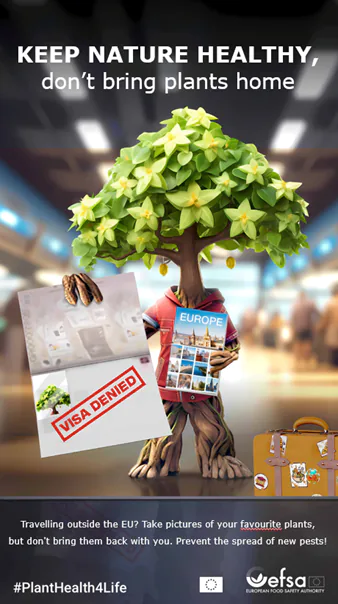A broad coalition of partners from across Europe joined forces to launch the #PlantHealth4Life campaign, whose objective is to raise awareness of the deep connections between plant health and our daily lives, as well as to encourage citizens’ actions in protecting plant health. The campaign is led by the European Food Safety Agency (EFSA), the European Commission (EC) and 22 European countries. The national ambassador of the campaign is the Croatian Agency for Agriculture and Food (HAPIH).
How does plant health affect our lives?
Plants make up 80% of the food we eat and provide the oxygen we breathe. However, that is not all: healthy plants mean a good agricultral yield which affects the food’s availability and affordability. Due to climate change and human activities such as trade and travel, plants are exposed to a great pressure, and spreading pests and plant diseases can have deteriorating economic and ecological consequences. Think of the potato blight that led to catastrophic crop losses in the mid-19th century, which was a key factor in the Great Famine in Ireland.
However, many european citizens still are not aware enough of the importance of plant health. PlantHealth4Life campaign’s aim is to raise collective awareness of risks to plant health and the role in plant protection each of us should have.
“Plant health affects not only the environment, the economy and the European food chain, but also our present and future. By preserving the health of plants, we protect life. We are therefore proud that Europeans are dealing with this topic, which is evident from the unprecedented participation of member states in the #PlantHealth4Life campaign”, said Tobin Robinson, head of EFSA’s Environment, Plants & Ecotoxicology Unit, who presented the campaign at the “Plant Health Without Borders” symposium (The health of plants without borders) organized by the Belgian Presidency of the Council of the EU in Brussels.
“Informed European citizens with accurate information regarding plant health can help protect and preserve our biodiversity”, said Claire Bury, Deputy Director General for Food Sustainability at the Directorate General for Health and Food Safety (SANTE). “Plant health is a priority of the European Commission within the “One Health” approach. If we inform people about the importance of not importing harmful organisms into the European Union and if we give them the necessary knowledge to take the appropriate measures, our impact will be visible.”
Sokolić: Only by joining efforts will we successfully preserve the health of plants
The multiannual and multinational #PlantHealth4Life campaign was developed at the request of the European Commission and based on an in-depth analysis of plant health perceptions and behaviors across the EU. This year, the campaign includes 21 member states and a candidate country, which is twice as many as compared to the previous year. Croatia also joined the campaign.
“In Croatia, every year we find new, foreign species of insects, the causative agents of plant diseases or harmful plants. Most of them are regulated by quarantine, while the others, even if they are detected in a timely manner, can cause damage and great losses in domestic agriculture, forestry and the environment”, said assistant professor Darja Sokolić, Ph.D, director of HAPIH, which is the national bearer of the campaign.
Croatia is currently struggling with Anoplophora chinensis, Flanescence doree, Aleurocanthus spiniferus, Ailanthus altissima, Drosophila suzukii, Rhynchophorus ferrugineus, Corythucha arcuata and other harmful organisms which have managed to enter our country and, more or less, spread in it.
“Therefore, we emphasize the importance of active role of all citizens in acting conscientiously in the context of travel and potential transmission, as well as in timely detection and reporting, thus preventing the spread of harmful organisms, because only with joint efforts will we successfully preserve the health of plants”, concludes Sokolić.
To maximize the campaign’s reach, it will be supported by the national partners: the Ministry of Agriculture, the State Inspectorate of the Republic of Croatia, the Faculty of Agriculture of the University of Zagreb, the Faculty of Agrobiotechnical Sciences Osijek, the Croatian Forestry Institute and Croatian Forests.
How can you protect the health of plants?
The activities of every single European are crucial for maintaining the health of plants. Visit the #PlantHealth4Life campaign’s website and find out how you can protect plant health. There are resources available in all EU languages.
You could find this useful, especially if you are:
- A curious traveler who enjoys exploring the world and nature
- A gardener who grows vegetables, flowers and trees at home, in their yard or on their balcony
- A parent who takes care of what their children eat and who wants to protect the agricultural communities, the environment and biodiversity for future generations
There will be many opportunities to participate in the campaign as it will include fairs, exhibitions and workshops in member states. Visit the campaign’s national website in to see what is happening in your country and look out for more information as they become available!
